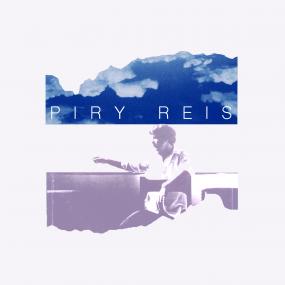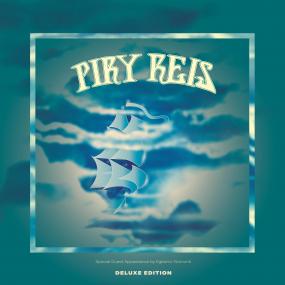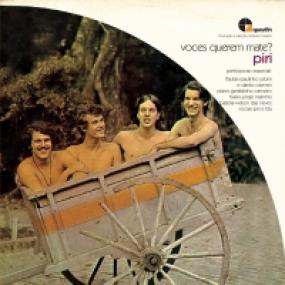In Conversation with Piry Reis (The Sniper)

Although he may not be a household name like some of his contemporaries, singer, composer and acoustic guitarist Piry Reis has been a major force in Brazilian music for more than four decades, exuding a sensitivity that only few of his fellow musicians can match. Rush Hour’s Rogier Oostlander talks to the maestro about coming of age as a musician, his years in exile and the recent rediscovery of his work by a new generation.
Can you tell us a bit about the environment you grew up in? Were you raised in a musical family? And what was the music you were exposed to as a youngster?
Piry: “I was born in a small town by the sea known as Macaé, The Princess of the Atlantic, on the Southeast coast of the Rio de Janeiro state. In the 1960s there were many amateur musicians in the city. On hot summer nights there were recitals everywhere throughout the city, both on the streets and on the beaches. People slept with the windows open to the sound of the music of stars. My two sisters and three brothers all played instruments; the piano, flute, accordion and acoustic guitar. At the age of eleven my brother NoNo brought me a gift, an acoustic guitar and three albums of the best music I had ever heard. They were ‘Studies for Acoustic Guitar’ by Villa Lobos, ‘Fados from the Iberian Peninsula’ and a record by Tom Jobim. These remained major influences on my work as a composer and instrumentalist throughout my life.”
How did you grow into becoming a professional musician?
“In the 1970s the Music Festival of Macaé City Hall invited Egberto Gismonti to the jury. I was lucky enough to win the first place in this event with my song ‘Viva México’. Gismonti invited me to join his band for touring both in Brazil and abroad. In Rio he introduced me to Milton Nascimento, Jobim and Luiz Eça, with whom I studied piano and jazz harmony. On acoustic guitar I had concert artist J Salgado as a master, and the Brazilian jazz guitarist Helio Delmiro.”
How did you get into recorded music from there?
“In another music festival, this time in Minas Gerais, I got placed among the ten best songs. The producers of the soap opera Carinhoso, the most popular TV show in Brazil back then, subsequently invited me to include my song ‘Red Ground’ on the soundtrack. That was my first recorded composition. Then came four more albums including the one that was recently relaunched worldwide.”
Was it hard to make a living as an aspiring musician in those formative years? Did you have to work the odd job on the side?
“Not really. I guess I was very lucky. I was only 17 when I recorded my first song for Carinhoso. That song earned me a good advance from the publisher that managed it. It also helped that the soundtrack sold thousands of copies. In addition, due to my skills and hard study of acoustic guitar, viola, mandolin and arrangements, I was invited to set up and rehearse with several groups to accompany famous singers at the time.”

The seventies were a time of great political turmoil in Brazil. Were you involved in or affected by politics in any way during those years?
“Yes, both affected and involved. We were fighting against totalitarianism, censorship, and suppression of individual freedoms. My weapons were the songs and lyrics which systematically called for freedom and spoke about heroes from other lands struggling against dictatorships. I was not directly involved in the armed struggle, but I secretly organized a group of friends to support those who were. I frequently housed persecuted militants in my small apartment in Rio until they found a way to get away. These actions cost me dearly. I was the target of an inquiry by the police and military as a suspect of collaboration with revolutionists. I decided not to attend the court hearing and fled the country, exiling myself in the US for eight years. When I returned to Brazil the inquiry was finished, but my career as a musician was obviously hampered by the long absence.”
How did you spend your days in exile? Where you able to make a living?
“I mainly lived from music lessons and played in jazz night clubs, singing American hits adapted to Brazilian rhythms. I also worked as a driver for a gem dealer, travelling around the country. All the while the only thing I thought of was returning to Brazil as soon as possible.”
Driver for a gem dealer? I need to hear more about that!
“I lived in Florida where the climate and waters of the Atlantic Ocean resemble Brazil. I legalized myself as an immigrant and traveled around the country visiting jewelers in different states. I used to accompany my boss to the City Bank to get the rough stones coming in from Africa and Brazil and pay the legal taxes. I then drove him around for an average of 45 days straight visiting his customers, the jewelers.”
Were you part of a larger exiled Brazilian community there?
“Yes. From the US we made plans for political actions in Brazil, however due to the lack of financial resources and difficulties with documents those never materialized.´
Looking back, do you consider these years in exile to be lost years?
“These were years of great learning.”
How was the situation when you returned to your home country? Did you feel Brazil had changed significantly?
“The situation changed a lot after the end of the military regime. Political and artistic activity in the country had ebbed. These were years of great development in cultural activities, music, theater and cinema. Years of great enthusiasm and hope for a fairer and safer social organization for all.”
Did you feel connected to any of the musical movements of the time?
“No, because I realized that my music could be a bridge between bossa and the modern popular music of the country. It was a daring idea, but I remained at it as a sniper, without any connections to any specific musical movement of the time.”
You are often associated with the great Egberto Gismonti, but you have of course been involved in numerous other collaborations. Can you tell us a bit about these?
“I was invited by the composer Sergio Ricardo to assemble, rehearse and collaborate on the arrangements to accompany him in concerts and in the recording of his most commercially successful album. Sergio was an icon of the Brazilian left in the fight against the restriction of liberties in the country. We did a series of concerts in São Paulo, in the capital and in several other cities. Most of the shows sold out. The people who were unable to get tickets literally tried to break down the gates of university campuses, football fields and theaters. In some events, Sergio asked security guards to open the gates to avoid further turmoil.”

You also wrote music for a lot of other great performers.
“As a composer, my works were recorded by great interpreters of Brazilian music such as Angela Maria, Beth Goulart and Jane Duboc. However, the most commercially successful song was the instrumental version of ‘Bailarina’, recorded by Egberto Gismonti, Jan Garbarek and Charles Haden. It’s the first track on ‘Magico’, an album that was released on the German jazz label ECM.”
Over the last years a lot of both classic and hard to find Brazilian music has been reissued, allowing a new generation to get acquainted with some of the best music to ever come out of Brazil, including your self-titled 1980 album. Is this something you’re happy about? And did you get a lot of reactions following that release?
“Yes, It makes me happy, as well as other Brazilian songwriters who are not well known both in Brazil and abroad. Related to my self-titled 1980 album, I got a lot of messages from all over the country, both by social media and email, asking me if the record was available for sale in Brazil. Most part of the messages express a feeling of surprise and gladness, for they do not know the album and appreciate the artistic quality of the songs. Surely the pandemic hindered the vinyl sales in Brazil a lot.”
Can you tell us a bit about the songs that are released on New Dawn this year?
“Yes, it’s a pleasure to talk about these songs. At the time I was both indirectly and directly involved in political activities. Eventually I hosted friends who were fleeing from the police. I used my acoustic guitar classes to camouflage their actions. The songs ‘Cisplatina’ and ‘Ceu de Managua’ talk about the social revolution in Latin America, the second one specifically about Nicaragua. In ‘Reza Brava’ and ‘Heroi Moderno’ we carefully placed a double meaning in the lyrics, trying to deceive the sharp swords of the cultural censors.”
2020 has been a challenging year for all of us. How have you spent your days? And what are your plans for this year?
“In early 2020 a nurse friend of mine, who is also a pupil in my acoustic guitar and harmony course, advised me to switch to digital classes due to the advance of the pandemic. Since then I'm teaching virtual classes and reserving time to study music, read, and write songs and lyrics. As soon as the pandemic slows down I’m planning a trip to the Netherlands to visit my friends and if possible perform one or two solo concerts. I’m looking forward to see myself in a plane to Europe with my acoustic guitar and my new songs.”
 Out now! Piry Reis 2x7" (New Dawn) |
 Piry Reis - Piry Reis |
 Piry Reis - Voces Querem Mate (Far Out Recordings) |
